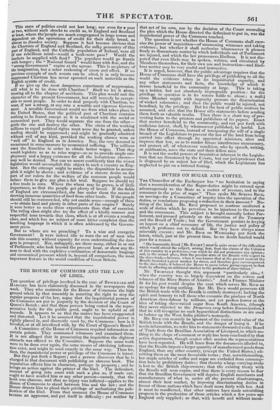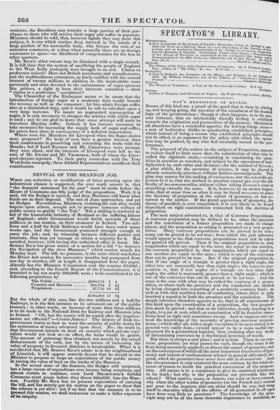DUTIES ON SUGAR AND COFFEE.
Tun Chancellor of the Exchequer has " no hesitation in saying that a reconsideration of the Sugar-duties might be entered upon advantageously to the State as a matter of revenue, and to the
consumer in the price of sugar." Thus spake Mr. SPRING RICE, on moving—for a Committee of inquiry into time operation of the
duties, or resolutions proposing a reduction in their amount ? No-
thing of the kind. Mr. Rica proposed to continue unaltered a scale of duties which he perceives to be injurious to the revenue and the consumers. This subject is brought annually before Par- liament, and pressed privately on the attention of the Treasury and the Board of Trade ; but the Government persists in levying an impost on a chief necessary of life, the justice and policy of which it professes not to defend. But they have always some miserable excuse ; and Mr. Rice on Wednesday put forth the latest, which, just at the present time, he no doubt fancied would pass for a reason.
" His honourable friend [Mr. EWART] must be quite aware of the difficulties which would attend the subject, arising, first, from the claims of the Colonies of this country to apreference' —on which he did not pronounce any opinion; and, in the second place, from the peculiar state of the Brazils with respect to the slate-trade,—because, when it was known that at the present moment the Brazils furnished a great market for slaves, and therefore gave encouragement to the slave-trade, it behoved the House to pause before giving support to that trade by affording an additional market to the products of slave-labour." Mr. THORIKELY thought this argument "particularly absta3. when the country was so largely dependent on the cotton and tobacco of time Slave States of °America." And a Finance Minister fit for his post would despise the cant which serves Mr. RICE as an apology for doing nothing. But Mr. RICE would persevere till time British trade with the Brazils is entirely destroyed; lacking the spirit and honesty to tell those who consume the produce of North American slave-labour by millions, and yet profess horror at the idea of taking slave-raised sugar from South America, (though they never objected to the Demerara crop before Emancipation ) that he will recognize no such hypocritical distinctions as are used to bolster up the West India planter's monopoly. Mr. RICE can scarcely be ignorant of the extent and value of the British trade with time Brazils, and the danger of losing it. If he needs information, we refer him to statements forwarded t o time Board of"frade from the Brazilian Association of Liverpool, to which no- thing in the shape of comment or reply has been vouchsafed by that active department, though session after session the representations have been repeated. He will learn from the documents alluded to, that. the Brazils import a larger quantity of manufactured goods from England, than any other country, (except the United States,) ad- mitting them on the most favourable terms ; that, notwithstanding, her staple articles of coffee and sugar are excluded from consump- tion here by prohibitory duties; that thereby a large carrying-trade is lost to the British ship-owners ; that the existing treaty with the Brazils will soon expire, and that there is every reason to fear that the Brazilian Government will deprive English merchants and manufacturers of what is, under all the present disadvantages, almost their best market, by imposing discriminating duties in fitvour of those nations which have dealt more fairly with her. And it must be recollected, that other nations have made astonishing progress in the production of those articles which a few years ago England only supplied; so that, with benefit and without mcon-
venience, the Brazilians may transfer a large portion of their pur- chases to those who will receive their sugar and coffee in payment. Ministers should be told, that, however lightly they may treat this subject, it is one which excites deep interest in the minds of a large portion of the mercantile body, who foresee the ruin of an extensive commerce, at a time when assuredly there are no foreign customers to spare—no likelihood of compensation for the loss in other quarters.
Mr. RICE'S other excuse may be dismissed with a single remark. It is full time that the system of sacrificing the people of England to the West India monopoly were brought to an end. Claims to preference indeed! Have not British merchants and manufacturers, and the multitudinous consumers, so lately saddled with the annual interest of twenty millions in addition to the incalculable sums previously and since devoted to the maintenance of sugar-growers like princes, a right to have their interests consulted — their " claims to a preference" considered?
The Chancellor of the Exchequer seems to be aware that the introduction of foreign sugar at a moderate duty would benefit the revenue as well as the consumer : let him admit foreign coffee also at a diminished duty, and it would be safe to calculate upon a very large increase. To insure an augmented consumption of sugar, it is only necessary to cheapen the articles with which sugar is used ; and we are glad to learn that some attempt will made to introduce Haytian coffee. Indeed, it has become necessary to take measures for increasing the supply both of sugar and coffee, for prices have risen in consequence of a deficient importation.
Where were the Members for Liverpool when the Sugar-duties were proposed? No body of men have a greater interest than their constituents in preserving and extending the trade with the Brazils; but if Lord SANDON and Mr. CRESSWELL were present, they were silent, and the interests of Liverpool were left to the care of Mr. EWART and Mr. THORNELY, both of whom the Liver- pool electors rejected. To their party connexion with the Tory West India monopoly, these faithful Representatives sacrificed their constituents.



























 Previous page
Previous page